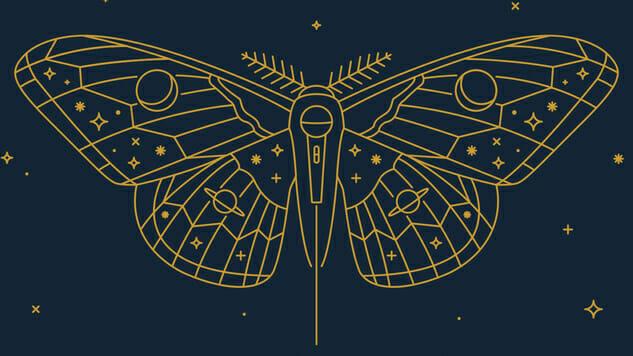The Moth’s All These Wonders Delivers a Mix of Captivating and Dull Stories

Twenty years ago, George Dawes Green began The Moth as a storytelling venture in Manhattan. The concept was simple: people would climb on stage and tell real-life yarns to audiences. Eventually The Moth became a hit—the podcast was transformed into something of a phenomenon.
The first book collecting 50 of these stories, simply titled The Moth, was published in 2013. And now this week marks the release of a second book, an anthology of 45 more stories titled The Moth Presents All These Wonders: True Stories About Facing the Unknown.
I found it a problematic business to review this new book. Not just because it’s a series of spoken monologues in printed form, thereby depriving the reader of important clues of tone, posture and context. Indeed, I am conflicted about the quality of this anthology.
 I found myself deeply moved half of the time, with some variation of the words “I will remember this for the rest of my life” echoing inside my head. Ishmael Beah’s story about being a child soldier playing paintball is forever stuck in my brain. And Kate Braestrup’s story, with the words “I love you Andy Dandy. Good-bye,” is enough to make a grown man cry in an Atlanta Tex-Mex restaurant. You would have to possess bones filled with rattlesnake venom to not love this book—most of the time.
I found myself deeply moved half of the time, with some variation of the words “I will remember this for the rest of my life” echoing inside my head. Ishmael Beah’s story about being a child soldier playing paintball is forever stuck in my brain. And Kate Braestrup’s story, with the words “I love you Andy Dandy. Good-bye,” is enough to make a grown man cry in an Atlanta Tex-Mex restaurant. You would have to possess bones filled with rattlesnake venom to not love this book—most of the time.
On the other hand, it would be inaccurate but not incorrect to describe All These Wonders as being This American Life meets Ivy League admission essays. It would be mean-spirited but not wrong to say the book reveals the kind of humanity Lena Dunham and high-profile ad agencies would invent in collaboration. It’s reminiscent of TED Talks, Maria Popova’s blog Brainpickings, Malcolm Gladwell at his most cloying, Mark Zuckerberg playing the ukulele.
So it’s necessary to break down the stories into four tiers, which coincidently line up in declining order of value:
1) Ordinary people who have been through miraculous or terrible events. These are fragments of beauty.
2) Academics and people with interesting jobs who have insightful thoughts on the world.
3) Trained entertainment professionals who are practiced masters of their craft
4) Facile, self-deprecating bundles of humblebrag.
Does this book half-amaze and half-annoy me, because the captivating stories are mixed in with the dull? Not quite.
Today’s society is in part defined by how quickly intense personal experience is churned into content. Laura Bennett calls this phenomenon “the first-person industrial complex.” This is not necessarily sinister; it’s the attempt of an information-overloaded culture to reconcile its own tendency to process, automate and desaturate the roughage of human experience into consumable chunks. We all know this, which is why we prioritize and celebrate “authenticity.” But too much authenticity can can evolve into commodified authenticity. The Moth, which is a noble project, comes close in this book.
In view of this, I give three-quarters of All These Wonders my highest praise, and the remaining quarter a curt dismissal. All these stories are true, but not all truth is found in these stories.







































